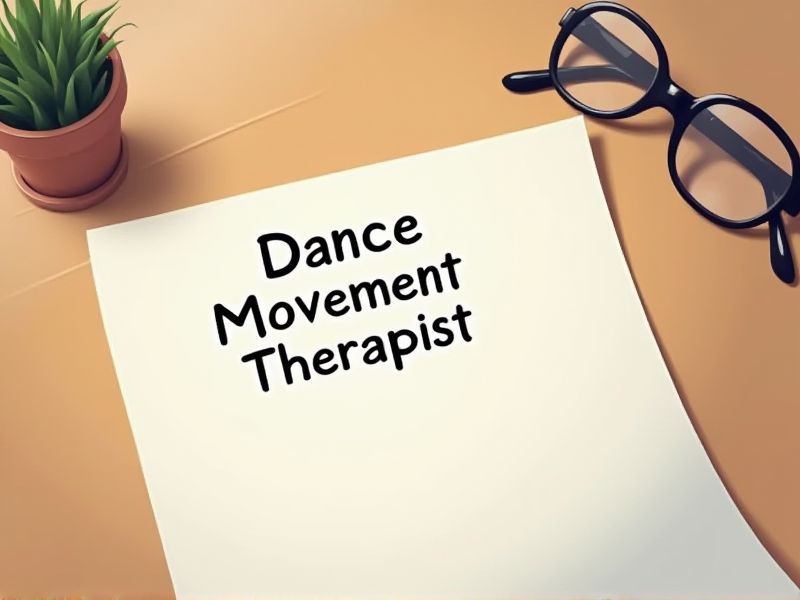
Dance Movement Therapists blend psychology and expressive arts to promote physical and emotional well-being. They require specialized training to understand the intricate connections between movement and mental health. Certifications verify their expertise in therapeutic techniques and ensure they meet professional standards. Here are some important certifications you may need for a career in Dance Movement Therapy.
Registered Dance/Movement Therapist (RDMT) Credential
The Registered Dance/Movement Therapist (RDMT) credential is essential because it signifies rigorous training and adherence to professional standards. Research indicates that therapists with formal credentials are more likely to provide effective treatment, enhancing patient outcomes in mental health settings. Having an RDMT also facilitates insurance reimbursement for services, making therapy more accessible to clients. The credential reinforces the therapist's commitment to ethical practice and ongoing professional development, which are critical for maintaining trust and credibility in therapeutic settings.
Certificate in Dance/Movement Therapy
A Certificate in Dance/Movement Therapy equips therapists with evidence-based techniques essential for addressing emotional and psychological needs through movement. Earning this credential ensures that therapists possess a comprehensive understanding of the interplay between body movement and mental health. The certification process enhances the practitioner's credibility and aligns with industry standards, fostering trust among clients and colleagues. Without this certificate, therapists may lack the necessary skills to effectively incorporate movement therapy into therapeutic interventions.
Expressive Arts Therapy Certification
Expressive Arts Therapy Certification equips dance movement therapists with a broader range of therapeutic tools that enhance their ability to address clients' diverse emotional and psychological needs. The certification fosters a multidisciplinary approach, integrating various forms of art like music, drama, and visual arts that enrich the therapeutic process through dance. It provides therapists with a deeper understanding of creative expression's impact on mental health, which facilitates more effective treatment outcomes. The knowledge gained through certification ensures that therapists maintain ethical standards and are up-to-date with best practices in therapeutic arts interventions.
Certified Arts Therapist (CAT)
Certified Arts Therapists are essential for Dance Movement Therapists to ensure that therapeutic interventions adhere to established psychological and artistic frameworks. By being certified, therapists gain a deeper understanding of both the therapeutic process and the creative expression inherent in dance. The certification process equips them with the skills necessary to assess and address clients' needs effectively. This dual expertise fosters a safe and supportive environment where clients can explore and resolve emotional challenges through movement.
Trauma-Informed Dance Movement Therapy Certification
Increased awareness of trauma's impact on mental health necessitates specialized knowledge for dance movement therapists. Trauma-informed certification equips therapists with skills to safely incorporate movement, understanding trauma's physiological and psychological effects. Such certification ensures therapists create supportive environments, reducing potential re-traumatization risks. Evidence shows that targeted trauma interventions improve therapeutic outcomes, underscoring certification's importance.
Certified Somatic Experiencing Practitioner
Certified Somatic Experiencing Practitioners bring expertise in trauma-informed care, which is vital for dance movement therapists working with clients who have experienced trauma. Their understanding of the nervous system's response to stress enhances therapeutic techniques, allowing for more effective trauma resolution through movement. The integration of somatic experiencing techniques can help dance movement therapists facilitate deeper, embodied healing experiences for clients. This certification ensures a comprehensive approach to therapy, addressing both psychological and physiological aspects of trauma.
Registered Clinical Therapist License
A Registered Clinical Therapist License is essential for a Dance Movement Therapist because it ensures they meet professional standards for safe and effective practice. The license signifies comprehensive training in both psychological and movement therapies, which is crucial for responsible client care. It provides legal authorization to practice, protecting both the therapist and clients under established regulations. Clients gain trust in the therapist's qualifications and ethical practice standards, enhancing therapeutic outcomes.
Certified Yoga Instructor
A certified yoga instructor provides a deep understanding of body alignment and movement, crucial for enhancing dance movement therapy sessions. Expertise in yoga improves flexibility and balance, essential components for safe and effective therapeutic dance. Mastery in breath control aids in stress reduction, benefiting clients seeking mental health support through movement therapy. Knowledge of meditation and mindfulness techniques facilitates creating a holistic therapeutic environment in dance sessions.
Mindfulness-Based Stress Reduction (MBSR) Certification
Mindfulness-Based Stress Reduction (MBSR) Certification equips dance movement therapists with techniques to enhance their clients' mindfulness skills, facilitating better emotional regulation and stress management. With the integration of MBSR, therapists can create a holistic approach, combining physical movement with mental awareness, leading to more effective therapeutic outcomes. Dance movement therapy students and professionals gain credibility and confidence when implementing mindfulness practices, as the certification backs their knowledge and skill set. MBSR provides structured methodologies that empower therapists to address stress-related issues in diverse client populations more effectively.
Certified Body Psychotherapy Practitioner
Certified Body Psychotherapy Practitioners provide a foundation in understanding the intricate connection between body and mind, which is crucial for Dance Movement Therapists. This understanding allows therapists to address both physical expression and emotional release effectively. Their expertise in body-awareness techniques can enhance the therapist's ability to facilitate healing through movement. The integration of psychotherapy knowledge ensures a more comprehensive approach to client well-being.
Summary
With certifications, you can expect to enhance your credibility as a Dance Movement Therapist. Certified therapists often gain access to broader job opportunities and are perceived as more skilled by clients and employers. Certification usually leads to a deeper understanding of therapeutic techniques, improving treatment outcomes. Over time, this can translate into personal and professional growth within the therapeutic community.
